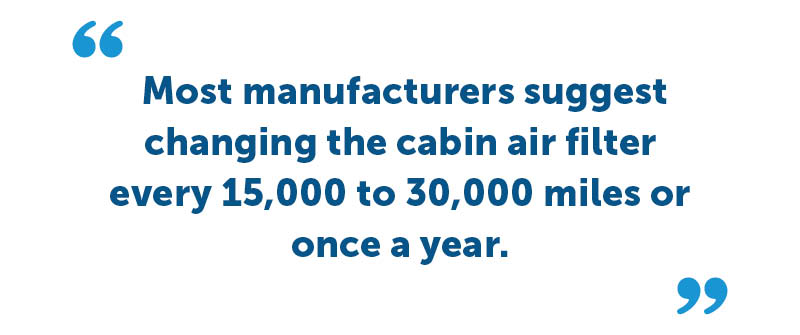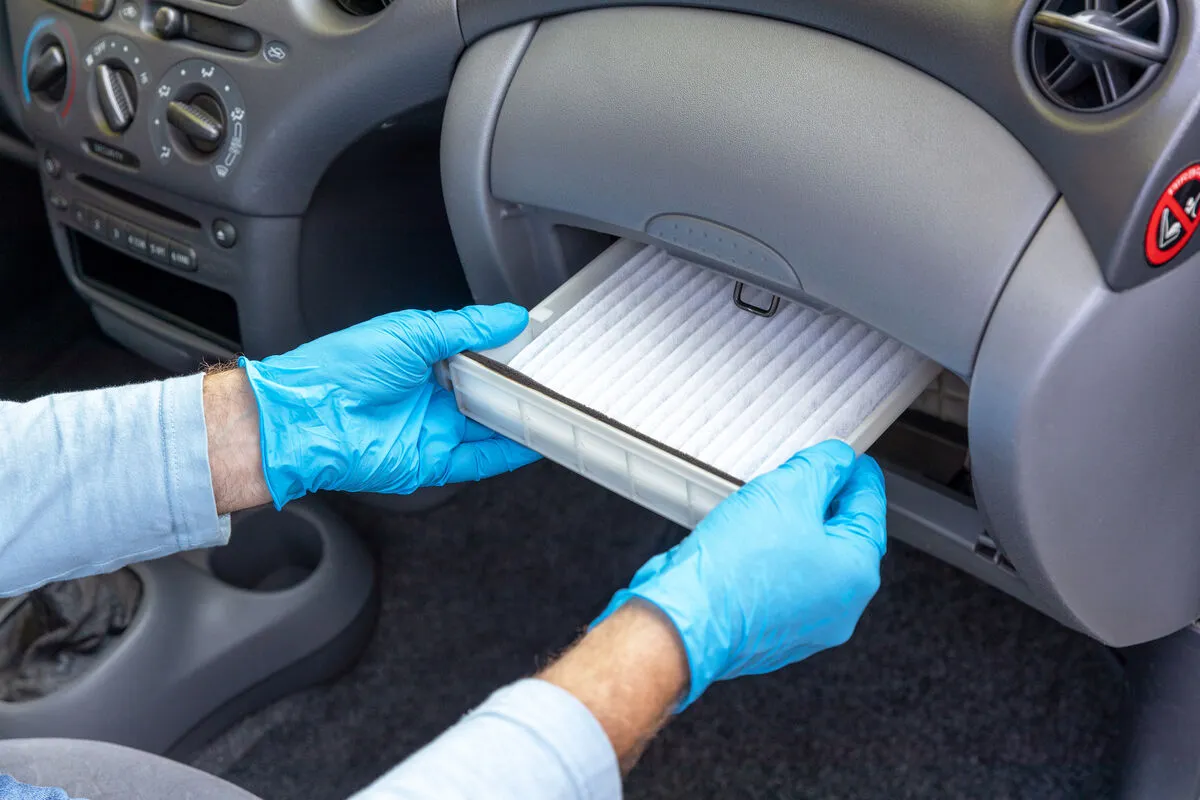How Long Does A Cabin Air Filter Last?
The cabin air filter lifespan typically ranges from 15,000 to 30,000 miles, or about once a year, depending on the vehicle and driving conditions. However, this can vary significantly based on several factors, such as the make and model of your car, the environment in which you drive, and the type of cabin air filter used.
Typical Lifespan of a Cabin Air Filter
In general, a high-quality cabin air filter can last for about a year or up to 30,000 miles in a vehicle that is driven under normal conditions. However, if your driving environment is particularly dusty or polluted, it may be necessary to replace the filter more frequently to maintain optimal air quality inside your vehicle.
Factors Affecting the Lifespan of a Cabin Filter
Cabin air filters help reduce exposure to particulate air pollutants while traveling in your car. Driving in urban areas with high pollution levels or frequently navigating through dirt roads can greatly impact the lifespan of your cabin air filter. Other environmental factors, such as seasonal changes and high pollen counts, can also reduce filter efficiency more quickly. The design and material of the filter itself, such as activated carbon versus standard paper filters, can also affect longevity.
Cabin Filter Mileage and Time Interval Recommendations
It’s crucial to follow your vehicle manufacturer’s replacement interval recommendations. For instance, Toyota often suggests replacing the cabin air filter every 15,000 miles, while Honda recommends inspection every 10,000 miles with replacement at 15,000 to 30,000 miles, depending on conditions. Regular inspections, particularly during an oil change, can help determine if a more frequent replacement schedule is needed.
Discount Filters offers a wide selection of durable and high-efficiency cabin air filters that help you adhere to these replacement recommendations easily, assuring you always have fresh and clean air inside your vehicle.

What Happens If You Don’t Replace The Cabin Air Filter?
Not replacing the cabin air filter can lead to a host of problems that affect both the air quality inside your vehicle and the overall functioning of its HVAC system. The cabin air filter plays a critical role in keeping the air inside your car clean, preventing dust, pollen, and other allergens from circulating.
Reduced Air Quality
A dirty or clogged cabin air filter can no longer effectively filter out pollutants, leading to poor air quality inside your car and reduced air flow. This can be particularly problematic for individuals with allergies or respiratory conditions, as they may be exposed to unfiltered air filled with dust and pollen. Breathing in these pollutants can exacerbate existing health issues and lead to an uncomfortable driving experience.
Decreased HVAC Efficiency
The cabin air filter is integral to your car’s HVAC system, which works tirelessly to maintain a comfortable interior temperature. A clogged filter can strain the blower motor, restricting airflow and forcing the HVAC system to work harder. Over time, this increased load can lead to decreased efficiency in heating and cooling, making it harder to maintain the desired temperature in your vehicle. Ultimately, this not only affects comfort but can also lead to increased energy consumption and higher fuel costs.
Potential Damages to the Vehicle
Beyond impacting air quality and comfort, a neglected cabin air filter can also cause damage to your vehicle. It is equally important to check the engine air filter in the air box, as a clogged filter can restrict airflow to the engine, affecting performance. When the filter is clogged, the increased strain on the HVAC system can lead to mechanical failures over time. In severe cases, this could result in costly repairs that could have been avoided with regular maintenance. Keeping your filter fresh helps protect against these potential issues.
How Do I Know If My Cabin Air Filter Needs Replacing?
Ensuring your vehicle’s cabin air filter is in optimal condition is crucial for maintaining air quality and overall comfort during your drives. So, how do you know if it’s time to replace it?
Signs of a Clogged Filter
An old or clogged cabin air filter often manifests through recognizable signs. You might notice a musty odor when you activate your car’s ventilation system. This unpleasant smell usually indicates that the filter is saturated with trapped pollutants, potentially including mold or bacteria.
Additionally, reduced airflow is a common symptom. If the air from your vents seems weaker than usual, your air filter might be struggling to allow sufficient passage due to accumulated debris, making it difficult for clean air to circulate. Another indicator is persistent fogging on the interior windows. A clogged filter can hinder the defogging process, resulting in reduced visibility, which can be hazardous.
Visual Inspection Tips
Conducting a visual inspection of your air filter, often accessed through the glove compartment, can provide clear insights into its condition. To do this, remove the old filter from its compartment, typically located behind the glove box, as mentioned earlier. Hold it against a light source; if you can’t see the light shining through or if it appears visibly dirty or gray, it’s a definitive cue for replacement.
Another element to check for is any sign of mold or mildew. These can develop in a filter that is too moist, posing health risks. If mold is evident, it’s wise to replace the filter immediately.
Manufacturer Guidelines
While a personal inspection is helpful, adhering to your vehicle manufacturer’s guidelines on the maintenance schedule for air filters is advisable. Most manufacturers suggest changing the cabin air filter every 15,000 to 30,000 miles or once a year. However, these intervals can vary based on the driving conditions and the environment in which you often operate your vehicle.
Frequent driving in dusty, heavily polluted, or urban environments may require more frequent replacements to maintain optimal air quality and filtration efficiency. Regardless, always consulting your vehicle’s manual or automotive expert is recommended for the most accurate advice pertaining to your specific vehicle and driving situations.

Do I Really Need To Change The Cabin Air Filter In My Car?
Understanding the Necessity of Changing the Cabin Air Filter
Your car’s cabin air filter is an essential component in ensuring a clean and healthy cabin environment. Often overshadowed by other maintenance tasks, it’s crucial not to overlook the benefits this filter brings, especially regarding health and vehicle efficiency.
Health Benefits
The primary role of the cabin air filter is to purify the air entering your car’s interior through the heating, ventilation, and air conditioning (HVAC) system. This filter traps dust, pollen, smog, and other airborne particles, crucially protecting your respiratory health, particularly if you or your passengers suffer from allergies or respiratory conditions. Ensuring that the filter is clean and functioning optimally can significantly improve the air quality in your car, making each journey more comfortable and healthier by enhancing the air that passengers breathe.
Importance in Vehicle Maintenance
A clean cabin air filter is also vital for the performance of your vehicle’s HVAC system. Installing a new filter is crucial to ensure optimal air quality and system efficiency. When the filter becomes clogged with dirt and debris, it can reduce airflow, making the system work harder to maintain desired temperature settings. This overexertion can lead to decreased efficiency and increased fuel consumption, as well as potentially causing wear and tear on HVAC components over time. Regular replacement ensures that your system functions efficiently, sparing you from additional repair costs. It is important to review your owner’s manual or an automotive trained technician for the most accurate advice.
Cabin Air Filter vs. Engine Air Filter
It’s important to distinguish between the cabin air filter and the engine air filter. While both are integral to your car’s operation, they serve different purposes. The engine air filter is responsible for cleaning the air that goes into the engine for combustion, thereby impacting performance and fuel efficiency. Neglecting to replace engine air filters can lead to restricted airflow, affecting engine efficiency, especially at higher RPMs. In contrast, the cabin air filter is concerned purely with the air inside the car, affecting passenger comfort and health. Both filters need regular attention, but neglecting the cabin air filter has direct repercussions on the air you breathe.
To ensure your car provides a healthy, pleasant driving environment, it’s imperative to change the cabin air filter regularly. Upgrade your vehicle maintenance routines with our top-quality cabin air filters at Discount Filters, providing your passengers with the freshest air on every journey.

